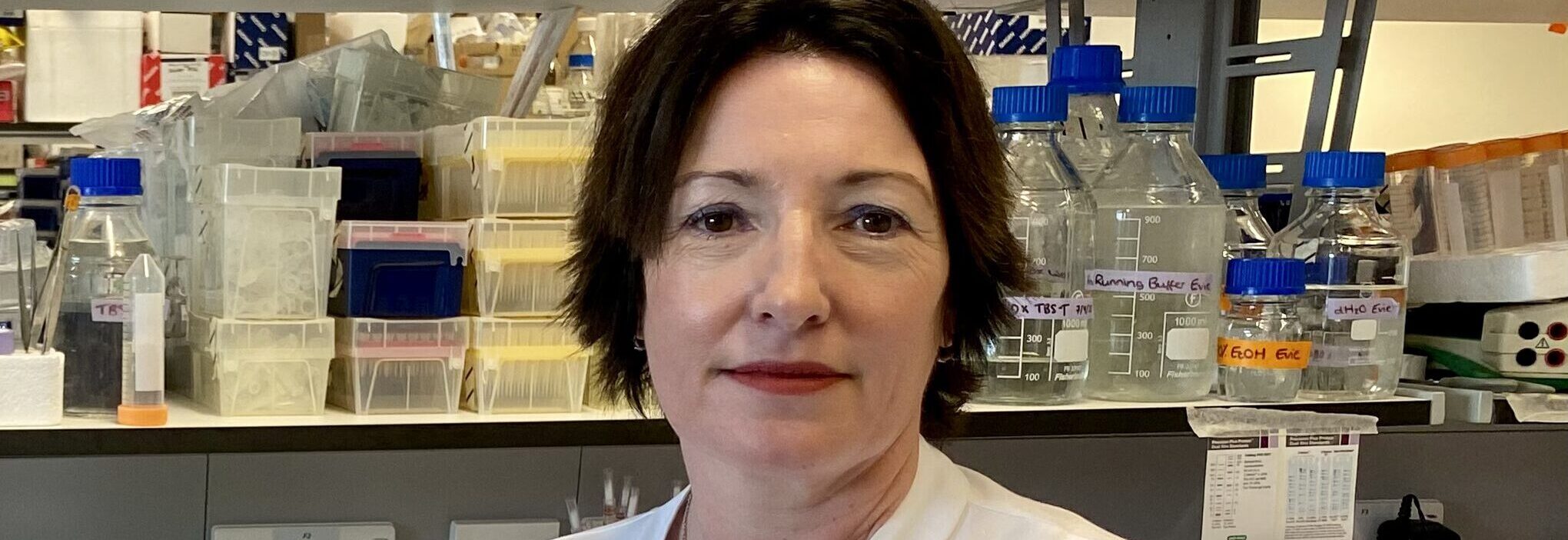
12 Jun 2025
The loss of her father drives Karen as a leukaemia researcher
Most people who receive a devastating leukaemia diagnosis know little if anything about blood cancer. This was true for Denis Keeshan, who was diagnosed with chronic myelomonocytic leukaemia (CMML) and eventually acute myeloid leukaemia (AML) at the age of 72. By contrast his daughter Karen almost knew too much. As Associate Professor at the Wolfson Wohl Cancer Research Centre at the University of Glasgow, and with a 25-year career in research into leukaemia, she understood all too well the science behind the disease. Karen is the Deputy Chair of the Project Grant Panel at Leukaemia UK, which every year allocates funding to research projects. Here she talks about the difficulties of supporting her father through his illness, and how her experience changed her approach to research for ever.
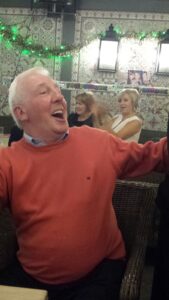 “Dad already had multiple health problems and was on lots of medication,” said Karen, 48. “He was a big character, a retired quantity surveyor who was the director of a large company. By the time he was diagnosed with leukaemia he lived a quieter life with my Mum who had recovered from lung cancer. But he was still a force to be reckoned with!
“Dad already had multiple health problems and was on lots of medication,” said Karen, 48. “He was a big character, a retired quantity surveyor who was the director of a large company. By the time he was diagnosed with leukaemia he lived a quieter life with my Mum who had recovered from lung cancer. But he was still a force to be reckoned with!
“He had no noticeable initial symptoms although in hindsight did have unexplained bruising. He got routine blood tests for his heart and in July 2022 his tests were fine. But at the end of September his haematologist called him and asked him to attend the clinic on Monday because there was something wrong.
“Dad phoned – he lived in Cork – and told me. It immediately became apparent he didn’t really understand what was happening. I tried to reassure him without explaining the detail but of course meanwhile was extremely worried. I couldn’t sleep that night and the next morning I said to my husband: “Dad’s got leukaemia, I just know it.”. I also thought it would be an aggressive one because of the quick change in his blood tests.”
After a bone marrow biopsy Denis was given an appointment the following week and Karen flew to Cork to be with him. On 6th October 2022 Denis was told he had myelodysplastic syndrome (MDS)/myeloproliferative neoplasms (MPN)/and possibly chronic myelomonocytic leukaemia 2 (CMML-2)-like blood disease. All types of blood cancer which can eventually become acute myeloid leukaemia (AML).
“It wasn’t yet AML so I knew it wasn’t the worst, but I knew it was terminal. I knew Dad would give up if he heard terminal, so I couldn’t tell him. It was very difficult for me, and for the consultant, to give him straight answers as well because we knew if he had good treatment he could live for several years. But getting him into a routine with the treatment proved to be impossible.”
Denis began treatment with Azacitidine and Venetoclax. But he didn’t respond well and ended up in hospital needing a blood transfusion. From that point on he would need transfusions every couple of weeks. Meanwhile genetic tests showed he had a JAK-2 mutation so he was then put on a JAK inhibitor drug.
“Dad was confused about all the medication. He didn’t understand one had to be given to him in hospital by injection into his abdomen, and the other was tablets at home – he was on around 13 different tablets by that time. Tablets were missed or doubled up and going to the hospital to get the injections really bothered him. Sometimes he would point blank refuse to go.
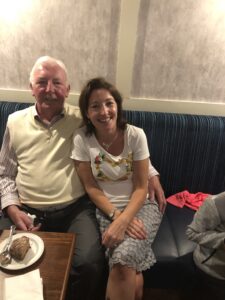
Denis and his daughter Karen on his 70th Birthday.
“Because of this they struggled to get his dose right and couldn’t normalise his bloods so he was reliant on transfusions. Mum had carers coming in as she had lung cancer and was in no position to help him, but he refused care for himself as well. My brothers did their best but there were so many tablets and they didn’t understand it all either. I came back to Cork as often as I could and did as much as I could. But one time when he was so ill he couldn’t get up out of a chair, he delayed seeking help and when we eventually got him to hospital his haemoglobin was 4.9. It should have been around 13 and you in theory should be dead at 4.”
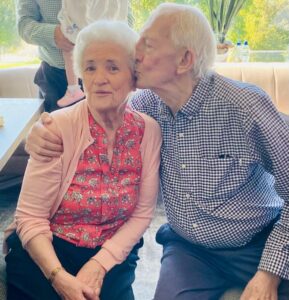
Denis with his wife on their 50th wedding anniversary!
Denis and Margaret were supported by care and medical treatment long enough to celebrate their 50th wedding anniversary on 8th September 2023. It was the last family gathering they had together and included their 11 grandchildren. Margaret was diagnosed with untreatable lung cancer again at this time and passed away on 3rd October, at which point Denis was in sepsis and admitted to hospital.
“I remember arguing with him in the hospital about going home alone. He was saying ‘all you want to do is lock me up’ and I was again trying to get him to understand how much help he needed. He was eventually discharged with a package of care including nurses visiting. But they rang him when he was home, and he told them he was fine and didn’t need them, so they didn’t come. His condition deteriorated and the next time he went into hospital for a blood transfusion they kept him in. He was only able to manage at home for about two weeks.”
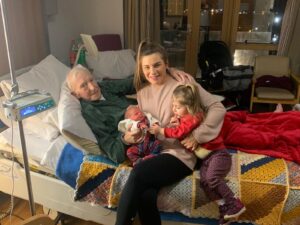
Denis with his new grandchild 5 days before he died
By this time doctors confirmed Denis’s blood cancer had become AML. He was moved into palliative care and then a care home and died on Christmas Day 2023 at the age of 73.
“This was the most difficult time of my life, losing both my parents to cancer within three months, whilst continuing to work submitting research applications on my leukaemia research ‘for better treatment’. The irony of course is I spent 25 years working on leukaemia research including post-doctorate research in Philadelphia, US, and starting my own research lab in Cork in 2008. When I moved to Glasgow in 2012 my research focus remained on AML, looking at the differences in the disease between young and older people. Another irony was the drugs we were researching were Venetoclax and JAK inhibitors, which Dad was put on.
“Seeing at firsthand what leukaemia did to Dad has changed me forever as a leukaemia researcher. I’m still interested in the science but what it showed me was the reality of the clinical side of it – the regular blood transfusions, the drug treatment, and the impact it has on a patient and the lives of those around them. Rather than doing some things in the lab now because they’re interesting, my entire focus is ‘will this lead to something?’. Will it lead to new information and treatments that will directly help patients? That’s my driver now, I want to make progress.
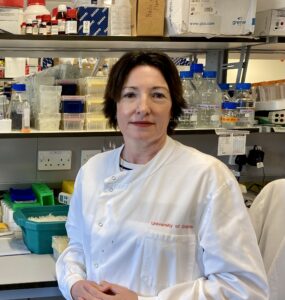
Karen at work
“Being on the Leukaemia UK Project Grant Panel as a scientific leukaemia expert and now as a family member having lost my Dad to AML, I try to bring both these experiences into my role – it really makes me appreciate the funding provided by the charity and how to help put it to best use for impactful science.”
Related posts
22 May 2023
Can the unique differences between stem cells tell us how well CML treatment will work?
What if we could predict how chronic myeloid leukaemia (CML) patients will respond to treatment? Could the unique signatures of CML stem cells hold the key to personalising treatment for…
11 February 2021
Why I became a Leukaemia UK Trustee
Caroline Evans – Leukaemia UK Trustee and Projects Consultant – reflects on why she became a Trustee and what drives her in the role.
12 June 2021
First Medical Research Council and Leukaemia UK Clinical Research Training Fellow shares project highlights
Dr Sandeep Potluri’s findings will contribute towards a better understanding, cure and treatments of leukaemia and blood cancers
11 January 2019
Myelofibrosis: Finding new ways to treat patients
Dr Edwin Chen, University of Leeds and John Goldman Fellow